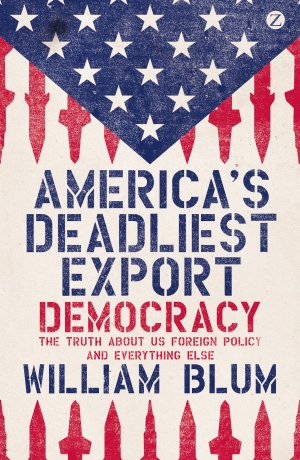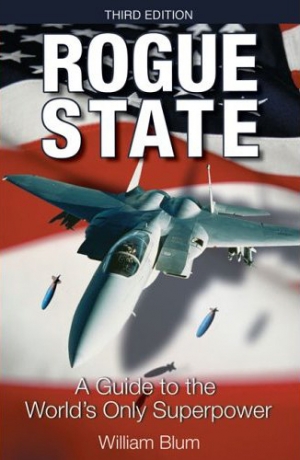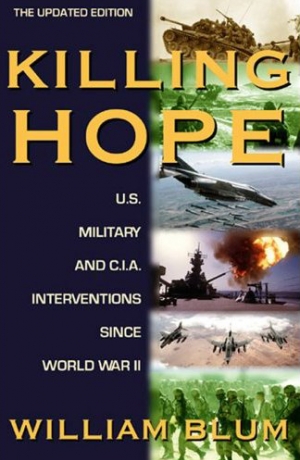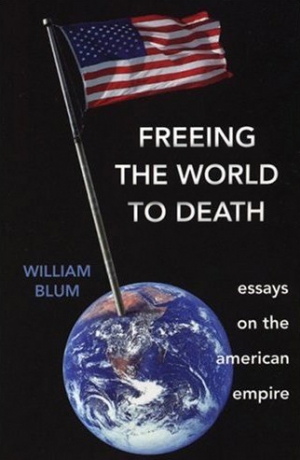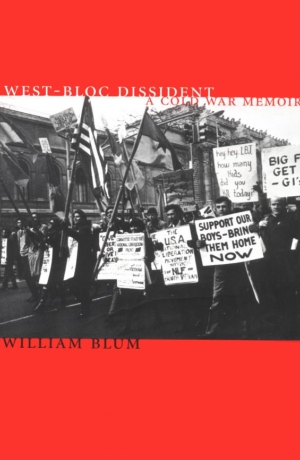Myth and Denial in the War Against Terrorism: Just why do terrorists terrorize?
It dies hard. It dies very hard. The notion that terrorist acts against the United States can be explained by envy and irrational hatred, and not by what the United States does to the world – i.e., US foreign policy – is alive and well.
The fires were still burning intensely at Ground Zero when Colin Powell declared: “Once again, we see terrorism, we see terrorists, people who don’t believe in democracy …” 1
George W. picked up on that theme and ran with it. He’s been its leading proponent ever since September 11 with his repeated insistence, in one wording or another, that terrorists are people who hate America and all that it stands for, its democracy, its freedom, its wealth, its secular government.” (Ironically, the president and Attorney General John Ashcroft probably hate our secular government as much as anyone.)
Here he is more than a year after September 11: “The threats we face are global terrorist attacks. That’s the threat. And the more you love freedom, the more likely it is you’ll be attacked.” 2
The American Council of Trustees and Alumni, a conservative watchdog group founded by Lynne Cheney, wife of the vice-president, announced in November 2001 the formation of the Defense of Civilization Fund, declaring that “It was not only America that was attacked on September 11, but civilization. We were attacked not for our vices, but for our virtues.” 3
In September 2002, the White House released the “National Security Strategy”, purported to be chiefly the handiwork of Condoleezza Rice, which speaks of the “rogue states” which “sponsor terrorism around the globe; and reject basic human values and hate the United States and everything for which it stands.”
In July of the following year, we could hear the spokesman for Homeland Security, Brian Roehrkasse, declare: “Terrorists hate our freedoms. They want to change our ways.” 4
Thomas Friedman the renowned foreign policy analyst of the New York Times would say amen. Terrorists, he wrote in 1998 after two US embassies in Africa had been attacked, “have no specific ideological program or demands. Rather, they are driven by a generalized hatred of the US, Israel and other supposed enemies of Islam.” 5
This idée fixe – that the rise of anti-American terrorism owes nothing to American policies – in effect postulates an America that is always the aggrieved innocent in a treacherous world, a benign United States government peacefully going about its business but being “provoked” into taking extreme measures to defend its people, its freedom and its democracy. There consequently is no good reason to modify US foreign policy, and many people who might otherwise know better are scared into supporting the empire’s wars out of the belief that there’s no choice but to crush without mercy – or even without evidence – this irrational international force out there that hates the United States with an abiding passion.
Thus it was that Afghanistan and Iraq were bombed and invaded with seemingly little concern in Washington that this could well create many new anti-American terrorists. And indeed, since the first strike on Afghanistan in October 2001 there have been literally scores of terrorist attacks against American institutions in the Middle East, South Asia and the Pacific, more than a dozen in Pakistan alone: military, civilian, Christian, and other targets associated with the United States, including the October 2002 bombings in Bali, Indonesia, which destroyed two nightclubs and killed more than 200 people, almost all of them Americans and their Australian and British allies. The following year brought the heavy bombing of the US-managed Marriott Hotel in Jakarta, Indonesia, the site of diplomatic receptions and 4th of July celebrations held by the American Embassy.
Even when a terrorist attack is not aimed directly at Americans, the reason the target has been chosen can be because the country it takes place in has been cooperating with the United States in its so-called “War on Terrorism”. Witness the horrendous attacks of recent years in Madrid, Turkey and Saudi Arabia.
A US State Department report on worldwide terrorist attacks showed that the year 2003 had more “significant terrorist incidents” than at any time since the department began issuing statistics in 1982; the 2003 figures do not include attacks on US troops by insurgents in Iraq. 6
Terrorists in their own words
The word “terrorism” has been so overused in recent years that it’s now commonly used simply to stigmatize any individual or group one doesn’t like, for almost any kind of behavior involving force. But the word’s raison d’être has traditionally been to convey a political meaning, something along the lines of: the deliberate use of violence against civilians and property to intimidate or coerce a government or the population in furtherance of a political objective.
Terrorism is fundamentally propaganda, a very bloody form of propaganda.
It follows that if the perpetrators of a terrorist act declare what their objective was, their statement should carry credibility, no matter what one thinks of the objective or the method used to achieve it. Let us look at some of their actual declarations.
The terrorists responsible for the bombing of the World Trade Center in 1993 sent a letter to the New York Times which stated, in part: “We declare our responsibility for the explosion on the mentioned building. This action was done in response for the American political, economical, and military support to Israel the state of terrorism and to the rest of the dictator countries in the region.” 7
Richard Reid, who tried to ignite a bomb in his shoe while aboard an American Airline flight to Miami in December 2001, told police that his planned suicide attack was an attempt to strike a blow against the US campaign in Afghanistan and the Western economy. In an e-mail sent to his mother, which he intended her to read after his death, Reid wrote that it was his duty “to help remove the oppressive American forces from the Muslims land.” 8
After the bombings in Bali, one of the leading suspects – later convicted – told police that the bombings were “revenge” for “what Americans have done to Muslims.” He said that he wanted to “kill as many Americans as possible” because “America oppresses the Muslims”. 9
In November 2002, a taped message from Osama bin Laden began: “The road to safety begins by ending the aggression. Reciprocal treatment is part of justice. The [terrorist] incidents that have taken place … are only reactions and reciprocal actions.” 10
That same month, when Mir Aimal Kasi, who killed several people outside of CIA headquarters in 1993, was on death row, he declared: “What I did was a retaliation against the US government” for American policy in the Middle East and its support of Israel. 11
It should be noted that the State Department warned at the time that the execution of Kasi could result in attacks against Americans around the world. 12 It did not warn that the attacks would result from foreigners hating or envying American democracy, freedom, wealth, or secular government.
Similarly, in the days following the start of US bombing of Afghanistan there were numerous warnings from US government officials about being prepared for retaliatory acts, and during the war in Iraq, the State Department announced: “Tensions remaining from the recent events in Iraq may increase the potential threat to US citizens and interests abroad, including by terrorist groups.” 13
Another example of the difficulty the Bush administration has in consistently maintaining its simplistic idée fixe: In June 2002, after a car bomb exploded outside the US Consulate in Karachi, killing or injuring more than 60 people, the Washington Post reported that “US officials said the attack was likely the work of extremists angry at both the United States and Pakistan’s president, Gen. Pervez Musharraf, for siding with the United States after September 11 and abandoning support for Afghanistan’s ruling Taliban.” 14
George W. and others of his administration may or may not believe what they tell the world about the motivations behind anti-American terrorism, but, as in the examples just given, some officials have questioned the party line for years. A Department of Defense study in 1997 concluded: “Historical data show a strong correlation between US involvement in international situations and an increase in terrorist attacks against the United States.” 15
Former US president Jimmy Carter told the New York Times in a 1989 interview:
We sent Marines into Lebanon and you only have to go to Lebanon, to Syria or to Jordan to witness first-hand the intense hatred among many people for the United States because we bombed and shelled and unmercifully killed totally innocent villagers – women and children and farmers and housewives – in those villages around Beirut. … As a result of that … we became kind of a Satan in the minds of those who are deeply resentful. That is what precipitated the taking of our hostages and that is what has precipitated some of the terrorist attacks. 16
Colin Powell has also revealed that he knows better. Writing of this same 1983 Lebanon debacle in his memoir, he forgoes clichŽs about terrorists hating democracy: “The U.S.S. New Jersey started hurling 16-inch shells into the mountains above Beirut, in World War II style, as if we were softening up the beaches on some Pacific atoll prior to an invasion. What we tend to overlook in such situations is that other people will react much as we would.” 17
The ensuing retaliatory attack against US Marine barracks in Lebanon took the lives of 241 American military personnel.
The bombardment of Beirut in 1983 and 1984 is but one of many examples of American violence against the Middle East and/or Muslims since the 1980s. The record includes:
- the shooting down of two Libyan planes in 1981
- the bombing of Libya in 1986
- the bombing and sinking of an Iranian ship in 1987
- the shooting down of an Iranian passenger plane in 1988
- the shooting down of two more Libyan planes in 1989
- the massive bombing of the Iraqi people in 1991
- the continuing bombings and sanctions against Iraq for the next 12 years
- the bombing of Afghanistan and Sudan in 1998
- the habitual support of Israel despite the routine devastation and torture it inflicts upon the Palestinian people
- the habitual condemnation of Palestinian resistance to this
- the abduction of “suspected terrorists” from Muslim countries, such as Malaysia, Pakistan, Lebanon and Albania, who are then taken to places like Egypt and Saudi Arabia, where they are tortured
- the large military and hi-tech presence in Islam’s holiest land, Saudi Arabia, and elsewhere in the Persian Gulf region
- the support of undemocratic, authoritarian Middle East governments from the Shah of Iran to the Saudis.
“How do I respond when I see that in some Islamic countries there is vitriolic hatred for America?” asked George W. “I’ll tell you how I respond: I’m amazed. I’m amazed that there’s such misunderstanding of what our country is about that people would hate us. I am – like most Americans, I just can’t believe it because I know how good we are.” 18
It’s not just people in the Middle East who have good reason for hating what the US government does. The United States has created huge numbers of potential terrorists all over Latin America during a half century of American actions far worse than what it’s done in the Middle East. If Latin Americans shared the belief of radical Muslims that they will go directly to paradise for martyring themselves in the act of killing the great Satan enemy, by now we might have had decades of repeated terrorist horror coming from south of the border.
As it is, there have been many non-suicidal terrorist attacks against Americans and their buildings in Latin America over the years.
To what extent do Americans really believe the official disconnect between what the US does in the world and anti-American terrorism? One indication that the public is somewhat skeptical came in the days immediately following the commencement of the bombing of Iraq on March 20 of this year. The airlines later announced that there had been a sharp increase in cancellations of flights and a sharp decrease in future flight reservations in those few days. 19
In June, the Pew Research Center released the results of polling in 20 Muslim countries and the Palestinian territories that brought into question another official thesis, that support for anti-American terrorism goes hand in hand with hatred of American society. The polling revealed that people interviewed had much more “confidence” in Osama bin Laden than in George W. Bush. However, “the survey suggested little correlation between support for bin Laden and hostility to American ideas and cultural products. People who expressed a favorable opinion of bin Laden were just as likely to appreciate American technology and cultural products as people opposed to bin Laden. Pro- and anti-bin Laden respondents also differed little in their views on the workability of Western-style democracy in the Arab world.” 20
The Iraqi resistance
The official Washington mentality about the motivations of individuals they call terrorists is also manifested in current US occupation policy in Iraq. Secretary of War Donald Rumsfeld has declared that there are five groups opposing US forces – looters, criminals, remnants of Saddam Hussein’s government, foreign terrorists and those influenced by Iran. 21 An American official in Iraq maintains that many of the people shooting at US troops are “poor young Iraqis” who have been paid between $20 and $100 to stage hit-and-run attacks on US soldiers. “They’re not dedicated fighters,” he said. “They’re people who wanted to take a few potshots.” 22
With such language do American officials avoid dealing with the idea that any part of the resistance is composed of Iraqi citizens who are simply demonstrating their resentment about being bombed, invaded, occupied, and subjected to daily humiliations.
Some officials convinced themselves that it was largely the most loyal followers of Saddam Hussein and his two sons who were behind the daily attacks on Americans, and that with the capture or killing of the evil family, resistance would die out; tens of millions of dollars were offered as reward for information leading to this joyful prospect. Thus it was that the killing of the sons elated military personnel. US Army trucks with loudspeakers drove through small towns and villages to broadcast a message about the death of Hussein’s sons. “Coalition forces have won a great victory over the Baath Party and the Saddam Hussein regime by killing Uday and Qusay Hussein in Mosul,” said the message broadcast in Arabic. “The Baath Party has no power in Iraq. Renounce the Baath Party or you are in great danger.” It called on all officials of Hussein’s government to turn themselves in. 23
What followed was several days of some of the deadliest attacks against American personnel since the guerrilla war began. Unfazed, American officials in Washington and Iraq continue to suggest that the elimination of Saddam will write finis to anti-American actions.
Another way in which the political origins of terrorism are obscured is by the common practice of blaming poverty or repression by Middle Eastern governments (as opposed to US support for such governments) for the creation of terrorists. Defenders of US foreign policy cite this also as a way of showing how enlightened they are. Here’s Condoleezza Rice:
[The Middle East] is a region where hopelessness provides a fertile ground for ideologies that convince promising youths to aspire not to a university education, a career or family, but to blowing themselves up, taking as many innocent lives with them as possible. We need to address the source of the problem. 24
Many on the left speak in a similar fashion, apparently unconscious of what they’re obfuscating. This analysis confuses terrorism with revolution.
In light of the several instances mentioned above, among others which could be cited, of US officials giving the game away, in effect admitting that terrorists and guerrillas may be, or in fact are, reacting to actual hurts and injustices, it may be that George W. is the only true believer among them, if in fact he is one. The thought may visit leaders of the American Empire, at least occasionally, that all their expressed justifications for invading Iraq and Afghanistan and for their “War on Terrorism” are no more than fairy tales for young children and grown-up innocents. But officialdom doesn’t make statements to represent reality. It constructs stories to legitimize the pursuit of interests. And the interests here are irresistibly compelling: creating the most powerful empire in all history, enriching their class comrades, remaking the world in their own ideological image.
Being the target of terrorism is just one of the prices you pay for such prizes, and terrorist attacks provide a great excuse for the next intervention, the next expansion of the empire, the next expansion of the military budget.
A while ago, I heard a union person on the radio proposing what he called “a radical solution to poverty – pay people enough to live on.”
Well, I’d like to propose a radical solution to anti-American terrorism – stop giving terrorists the motivation to attack America. As long as the imperial mafia insist that anti-American terrorists have no good or rational reason for retaliation against the United States for anything the US has ever done to their countries, as long as US foreign policy continues with its bloody and oppressive interventions, the “War on Terrorism” is as doomed to failure as the war on drugs has been.
If I were the president, I could stop terrorist attacks against the United States in a few days. Permanently. I would first apologize – very publicly and very sincerely – to all the widows and orphans, the impoverished and the tortured, and all the many millions of other victims of American imperialism. Then I would announce to every corner of the world that America’s global military interventions have come to an end. I would then inform Israel that it is no longer the 51st state of the union but -ññ oddly enough -ññ a foreign country. Then I would reduce the military budget by at least 90% and use the savings to pay reparations to the victims and repair the damage from the many American bombings, invasions and sanctions. There would be more than enough money. One year’s military budget in the United States is equal to more than $20,000 per hour for every hour since Jesus Christ was born. That’s one year.
That’s what I’d do on my first three days in the White House. On the fourth day, I’d be assassinated.
September 11 Commission
On June 16, 2004, the National Commission on Terrorist Attacks Upon the United States (investigating the events of September 11, 2001), issued a report which stated that Khalid Sheik Mohammed, regarded as the mastermind of the attacks, wanted to personally commandeer one aircraft and use it as a platform to denounce U.S. policies in the Middle East. Instead of crashing it in a suicide attack, the report says, Mohammed planned to kill every adult male passenger on the plane, contact the media while airborne, and land at a U.S. airport. There he would deliver his speech before releasing all the women and children. 25
The question once again arises: Why was Mohammed planning on denouncing US policies in the Middle East? Why wasn’t he instead planning to denounce America’s democracy, freedom, wealth and secular government?
Two days later, Islamic militants in Saudi Arabia beheaded an employee of the leading US defense contractor, Lockheed Martin, maker of the Apache helicopter, on which the victim, Paul Johnson, Jr. had long worked. His kidnappers said he was singled out for that reason. “The infidel got his fair treatment. … Let him taste something of what Muslims have long tasted from Apache helicopter fire and missiles.” 26
Addendum: Terrorists as mentally retarded
The reluctance to ascribe rational human motivations to militant political opponents is not confined to American leaders. Documents disclosed in 2002 in Spain reveal that during the 1936-39 civil war, the Spanish fascists subjected their leftist prisoners to a battery of physical and psychological tests for the purpose finding some inherent deformity that would explain their bizarre ideology. Unsurprisingly, they concluded that amongst the captured members of the pro-republican International Brigades, almost a third of the British nationals were “mental retards”. Another third were deemed to be suffering degenerative mental illnesses that were turning them into schizoids, paranoids or psychopaths. Their fall into Marxism was, in turn, exacerbated by the fact that 29% were also considered “social imbeciles”. As The Guardian of London noted:
For dictator General Francisco Franco’s chief psychiatrist, Dr. Antonio Vallejo Nagera, it must have seemed obvious. If the generalissimo and his fellow right-wing rebels in the Spanish civil war were crusaders for justice, God and the truth, then their leftwing opponents had to be mad, psychotic or at least congenitally subnormal.
Dr. Vallejo concluded: “Once more we see confirmed that social resentment, frustrated aspirations and envy are the sources of Marxism. 27
Also in 2002, it was reported that:
In an attempt to divine the terrorist impulse, German officials authorized the removal and study of the brains of four Red Army Faction leaders following their deaths in the 1970s, according to news reports in Germany, but scientists apparently came up with no physiological explanation for the leaders’ political violence. 28
Anything for officials to avoid facing up to social and political realities.
Notes
- Miami Herald, September 12, 2001
- Agence France Presse, November 19, 2002
- The Guardian (London), December 19, 2001, article by Duncan Campbell
- Washington Post, August 1, 2003, p.4
- New York Times, August 22, 1998, p.15
- Washington Post, June 23, 2004
- Jim Dwyer, et al., Two Seconds Under the World (New York, 1994), p.196; see also the statement made in court by Ramzi Ahmed Yousef, who planned the attack, New York Times, January 9, 1998, p.B4
- Washington Post, October 3, 2002, p.6
- Agence France Press, December 23, 2002; Washington Post, November 9, 2002
- Los Angeles Times, November 13, 2002, p.6
- Associated Press, November 7, 2002
- Ibid.
- Voice of America News, April 21, 2003
- Washington Post, June 15, 2002
- US Department of Defense, Defense Science Board 1997 Summer Study Task Force on DOD Responses to Transnational Threats, October 1997, Final Report, Vol.1, p.31
- New York Times, March 26, 1989, p.16
- Colin Powell with Joseph E. Persico, My American Journey (New York, 1995), p.291
- Boston Globe, October 12, 2001, p.28
- Washington Post, March 27, 2003
- Ibid., June 4, 2003, p.18
- Pentagon briefing, June 30, 2003
- Washington Post, June 29, 2003
- Ibid., July 24, 2003, p.7
- Ibid., August 8, 2003
- Ibid., June 17, 2004, p.14
- Associated Press, June 19, 2004
- The Guardian (London), November 1, 2002
- Washington Post, November 19, 2002
This is a chapter from Freeing the World to Death: Essays on the American Empire by William Blum.
